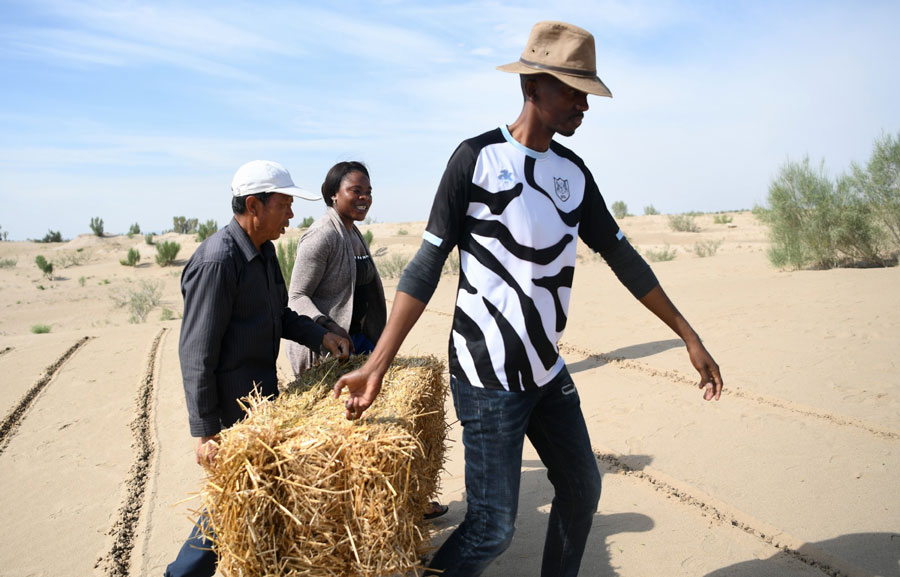Party members spearhead fight against poverty
China Daily,October 17, 2018 Adjust font size:
Nakanyala Elina Shekupe (center), from Namibia, learns desertification control in Minqin county, Gansu province. The agriculture official and 11 others were on a program organized by the Ministry of Commerce. [Photo/Xinhua]
Action advanced
Targeted measures designed to help poor people in rural areas shake off poverty have been pushed forward. They include: developing industries; improving education and medical services; building adequate infrastructure and facilities; helping migrant workers find jobs; and relocating people living in "hostile" conditions and "fragile" environments to more prosperous areas.
The central authorities coordinate the entire program, provinces take responsibility, while cities and counties ensure the policies are implemented. Overall responsibility for the work lies with the Party and government chiefs.
In the past five years, the nation's poverty-stricken population has been reduced by 13 million on average every year, from 98.99 million at the end of 2012 to 30.46 million at the end of last year.
Xi has said on various occasions that the battle has entered the toughest stage, as about 30 million remain to be lifted out of poverty in the next three years, including those who are ill or handicapped.
Du, the first Party secretary, said Xi's theory on targeted poverty alleviation has been well received in the villages as well as among first Party secretaries.
"To win the battle against poverty, superficial work must be rejected. We poverty relief officials must root ourselves in the village, have firm resolve and work hard in a down-to-earth manner," she said.
In addition to developing the tourism business, Du has introduced measures such as an e-commerce training program, microloans and a solar photovoltaic project to help poor villagers.
Liu Fenbao, a villager in Zhaizeping, could only afford to raise 30 sheep because of his limited capital. Last year, Du helped him secure a loan of 50,000 yuan, enabling him to buy more lambs. He can now raise 160 sheep and expects his income to rise by the end of this year.
Du has kept a picture she painted last year depicting her ideal "beautiful village" in the countryside.
She said poverty alleviation should be linked with the nation's Village Revitalization Plan and efforts to build beautiful villages.
With her two-year term as first Party secretary ending next month, she said she hopes the poor villagers can sustain better lifestyles after she leaves Zhaizeping.
Ian Goldin, a professor of globalization and development at the University of Oxford, wrote in an article headed "Chinese miracle: lessons in poverty eradication", which was published on the China Watch website in August that Chinese poverty reduction is a success story of historic significance.
The article stated, "The Chinese experience offers vital lessons, which demonstrate that with the necessary will the global targets of the Sustainable Development Goals can be achieved."
While working to eradicate poverty nationwide, the country is also developing international partnerships.
According to the State Council Leading Group Office of Poverty Alleviation and Development, China has held 133 poverty-reduction seminars and shared its experience with 3,587 poverty-reduction practitioners from 133 countries and regions, including 2,122 representatives from 52 African countries.
Speaking at the China-Africa Poverty Reduction and Development Conference in Beijing in August, Josefa Sacko, the commissioner for rural economy and agriculture of the African Union, commended the Chinese government for helping to reduce poverty on the continent.
Through the AU and China's cooperation on rural economy and agricultural development, technology transfers from the nation to Africa have taken place in various sectors, Sacko said at the conference.
She said these include visits by experts and assistance in crop planting, pest disease prevention and control, product processing, livestock breeding, fish farming and private investments in medium-to large-scale farms.
Thandanani Wah Ziqubu, a researcher and political activist from South Africa, completed his Master's in public administration at the Institute of South-South Cooperation and Development at Peking University in June.
During the one-year program, Ziqubu saw China as a model for development both theoretically and practically as the syllabus focused on political, economic and social aspects of development and how such factors can be accommodated in sustainable governance.
"During field trips, I have seen the government's action in reducing poverty, especially in rural areas," Ziqubu said, adding that although there are challenges, President Xi's step-by-step approach has been very effective.

eefc7ccb-9b54-4008-95b6-26cb273d572a.jpeg)
